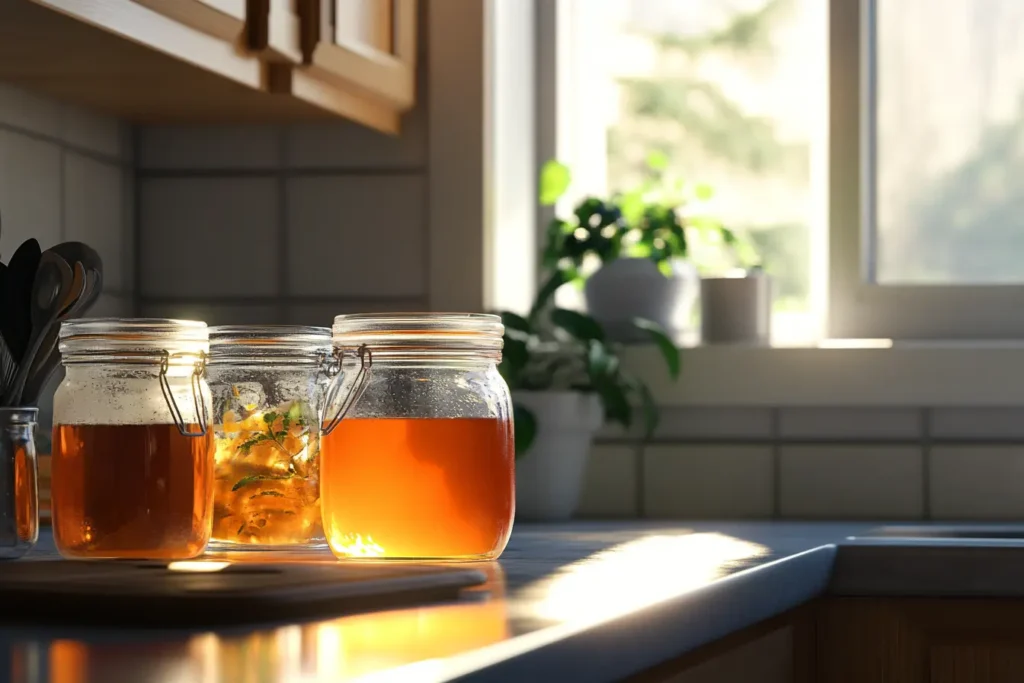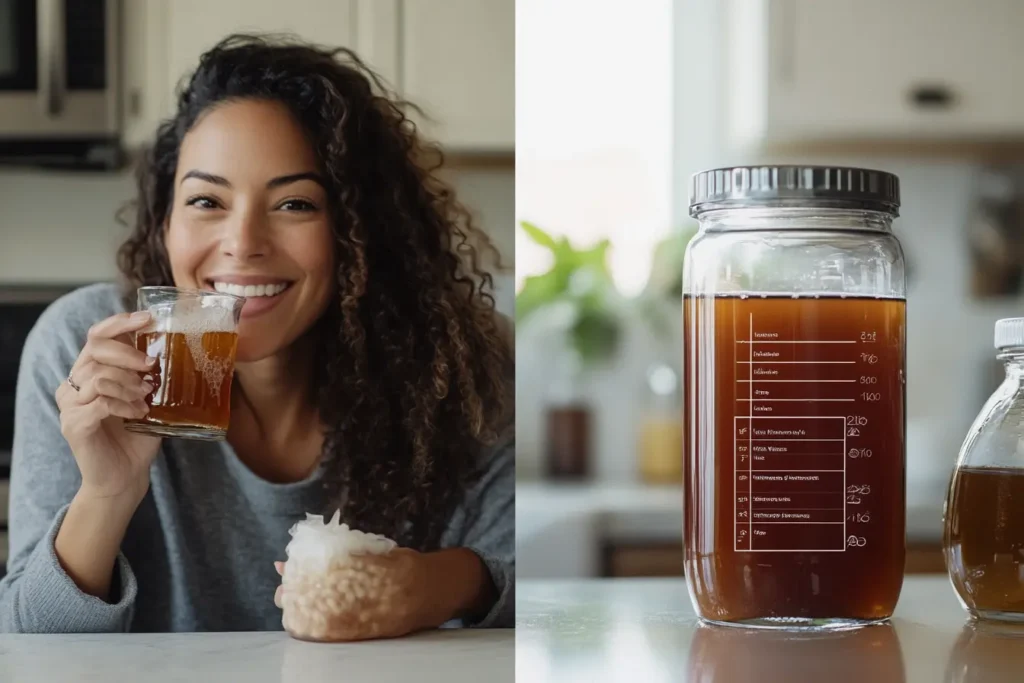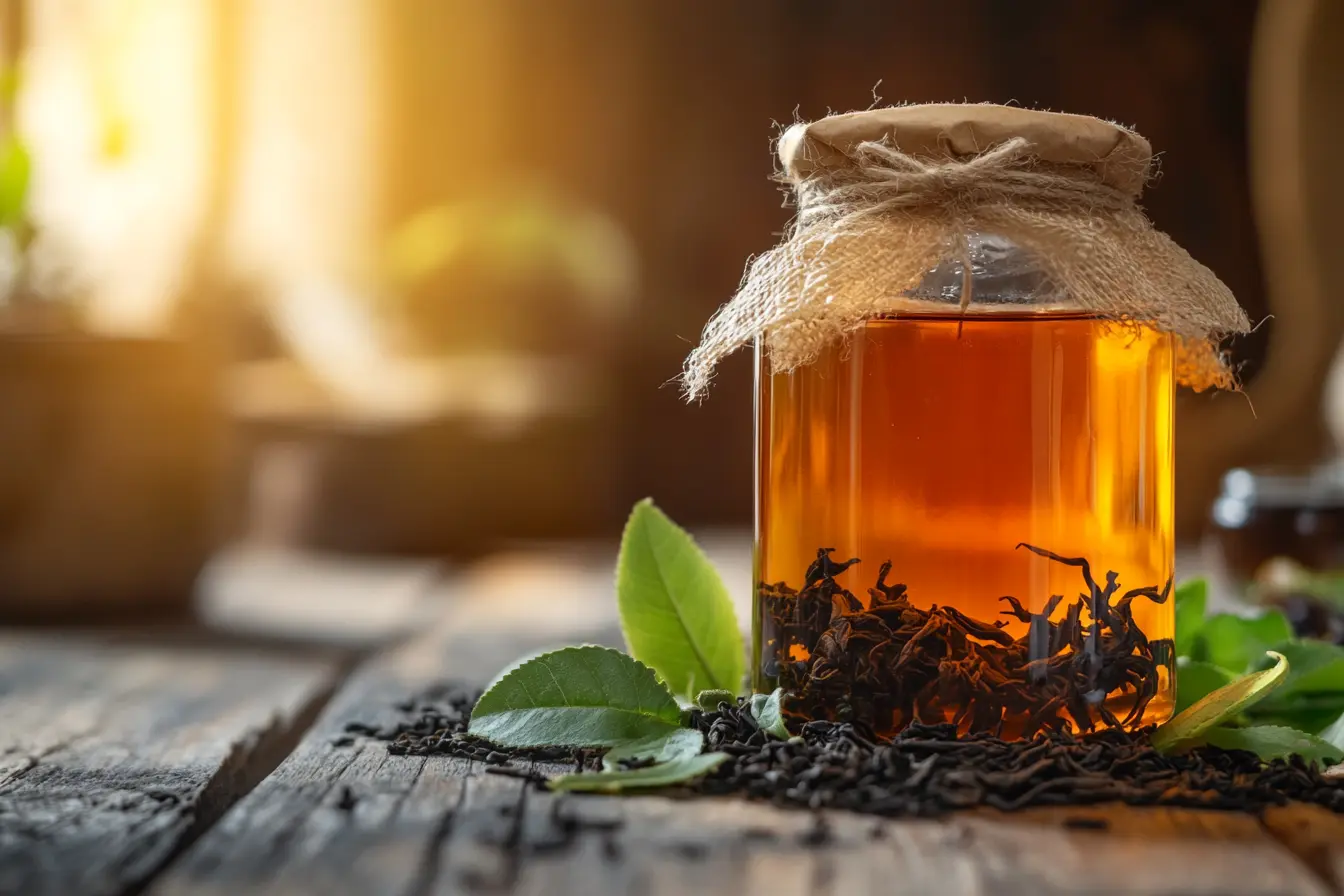Introduction
Does Kombucha Have Caffeine? This question often comes up for health-conscious individuals, caffeine-sensitive drinkers, and kombucha enthusiasts alike. Kombucha, a fermented tea praised for its gut health benefits, has surged in popularity. However, its caffeine content remains a topic of curiosity. In this comprehensive guide, we’ll explore everything you need to know about kombucha’s caffeine levels, factors influencing its content, low-caffeine options, and more.
Introduction to Kombucha and Its Caffeine Content
Understanding Kombucha
Kombucha, an ancient fermented tea drink, is made using tea, sugar, water, and a SCOBY—a symbiotic culture of bacteria and yeast. The result is a tangy, effervescent beverage packed with probiotics and potential health benefits. While the drink’s origins are rooted in traditional medicine, its popularity today is linked to modern wellness trends.
What Is Kombucha?
At its core, kombucha is a tea-based drink fermented over a period of days or weeks. During this process, the tea sugars are consumed by the bacteria and yeast, producing a naturally fizzy drink that contains trace amounts of caffeine. This makes kombucha a unique blend of refreshment and mild stimulation.
The type of tea used—typically green or black tea—largely determines its flavor, benefits, and caffeine content. By the end of fermentation, kombucha contains significantly less caffeine than its unfermented tea counterpart.
The Fermentation Process of Kombucha
Fermentation is what makes kombucha special. During brewing, the SCOBY breaks down sugars into organic acids, carbon dioxide, and trace alcohol (which remains minimal). This process alters the original caffeine concentration in the tea.
For instance, tea leaves used at the start of brewing might have a certain caffeine level, but fermentation reduces the amount. The result is a drink that’s less stimulating than a standard cup of tea. Still, how much caffeine remains depends on factors like steeping time and fermentation length, which we’ll explore in later parts.
Does Kombucha Contain Caffeine?
If you’re wondering whether kombucha has caffeine, the short answer is yes—but not in significant amounts.
Source of Caffeine in Kombucha
The primary source of caffeine in kombucha is the tea used in brewing. Black tea, known for its robust flavor, contains the highest caffeine levels, while green tea offers a milder option. Surprisingly, even herbal tea kombucha can have traces of caffeine if mixed with tea leaves containing caffeine.
Comparing Caffeine Levels in Kombucha and Other Beverages
Compared to coffee or energy drinks, kombucha’s caffeine levels are much lower. A typical glass of kombucha (8 ounces) contains about 10–15 mg of caffeine, whereas an equivalent cup of black tea may have up to 50 mg, and coffee significantly more.
By understanding the sources of kombucha’s caffeine, we can better explore how this refreshing drink fits into various diets and lifestyles.
Factors Influencing Caffeine Content in Kombucha
Kombucha caffeine content can vary depending on several critical factors. From the type of tea you choose to how long you steep it, each step in the brewing process plays a pivotal role in determining the final caffeine concentration.
Factors Affecting Caffeine Levels in Kombucha
Type of Tea Used in Brewing
The type of tea forms the foundation of kombucha’s caffeine levels. Black tea, rich in flavor, generally contains higher caffeine, while green tea offers a milder alternative. Herbal teas like rooibos or chamomile, which naturally lack caffeine, can be excellent choices for low-caffeine kombucha. However, combining these with caffeinated teas can introduce traces of caffeine.
Duration of Tea Steeping
Steeping time directly impacts caffeine extraction. A longer steeping period increases the caffeine content in the tea base before fermentation begins. To reduce caffeine, keep steeping times brief, typically under 5 minutes for black or green tea.
Length of Fermentation Period
The fermentation period also influences caffeine levels. During fermentation, the SCOBY metabolizes caffeine to some extent, reducing its concentration. Longer fermentation can further lower caffeine but may result in a tarter flavor profile.
Influence of Additional Ingredients
Additional ingredients, such as spices or fruits, have minimal impact on caffeine. However, they enhance flavor, making kombucha more enjoyable for those seeking low-caffeine options.

A Simple Recipe for Low-Caffeine Kombucha
Crafting low-caffeine kombucha at home is both fun and rewarding. Below is a step-by-step guide with precise instructions to help you brew your own.
Ingredients
- 4 cups (1 liter) filtered water
- 2 teaspoons loose-leaf green tea or 2 green tea bags
- 1 cup (200 grams) organic cane sugar
- 1 cup (250 ml) starter kombucha (from a previous batch or store-bought)
- 1 SCOBY (symbiotic culture of bacteria and yeast)
- Glass jar (1 gallon or larger)
- Tight weave cloth or coffee filter and rubber band
Step-by-Step Brewing Instructions
- Prepare the Tea Base:
- Boil 4 cups of filtered water in a kettle. Remove from heat and add 2 teaspoons of green tea leaves or 2 tea bags. Let steep for 3–4 minutes for a mild caffeine profile.
- Add Sugar:
- While the tea is still warm, stir in 1 cup of sugar until fully dissolved. Allow the mixture to cool to room temperature (important to avoid harming the SCOBY).
- Transfer to the Brewing Jar:
- Pour the cooled tea into a clean glass jar. Add the starter kombucha and gently place the SCOBY on top. Cover the jar with a tight weave cloth and secure it with a rubber band.
- Ferment:
- Place the jar in a warm, dark location (70–75°F or 21–24°C) for 7–14 days. Taste the kombucha after 7 days to check for your preferred flavor and caffeine reduction.
- Bottle and Flavor (Optional):
- Remove the SCOBY and reserve a cup of kombucha for your next batch. Strain the kombucha into glass bottles, adding fruit or spices for additional flavor if desired. Let the bottles ferment for another 2–3 days to develop carbonation.
- Refrigerate and Serve:
- Transfer the bottles to the fridge to halt fermentation. Serve chilled and enjoy!
Nutritional Content (Per 100g)
Below is the nutritional breakdown for low-caffeine kombucha, formatted in a well-designed HTML table for better readability.
| Nutrient | Amount per 100g |
|---|---|
| Calories | 13 kcal |
| Caffeine | 5–8 mg |
| Carbohydrates | 3.3 g |
| Sugars | 2.6 g |
| Probiotics | Varies |
Decaffeinated Kombucha Options
For those seeking a caffeine-free lifestyle or needing to reduce their intake, decaffeinated kombucha offers a perfect solution. While kombucha inherently contains caffeine due to its tea base, various methods and alternatives can help minimize or eliminate it entirely.

Decaffeinated and Low-Caffeine Kombucha
Brewing Kombucha with Decaffeinated Tea
One of the easiest ways to reduce caffeine in kombucha is by using decaffeinated tea. Opt for high-quality decaffeinated black or green tea processed using the CO2 method, which retains flavor and antioxidants without the caffeine.
To brew, follow the standard kombucha recipe but replace regular tea with your decaffeinated choice. The fermentation process remains the same, and the end result is a flavorful, fizzy beverage with negligible caffeine content.
Herbal Tea Alternatives for Kombucha Brewing
Herbal teas, like rooibos, hibiscus, and chamomile, are naturally caffeine-free and make excellent bases for kombucha. These teas provide unique flavor profiles, from the earthy richness of rooibos to the floral tartness of hibiscus.
However, it’s important to note that herbal teas lack the tannins present in traditional tea, which may slightly alter the fermentation process. To compensate, adding a small amount of black or green tea to the mix ensures proper SCOBY health without significantly increasing caffeine levels.
Commercially Available Low-Caffeine Kombucha Brands
Many kombucha manufacturers cater to caffeine-conscious consumers by offering low-caffeine or decaf options. Brands often use herbal teas, decaffeinated tea blends, or shorter fermentation periods to create kombucha with minimal caffeine. Check product labels to verify caffeine content and choose the one that fits your preferences.
Why Choose Low-Caffeine Kombucha?
Low-caffeine kombucha is ideal for those with caffeine sensitivity, children, or individuals avoiding stimulants for health reasons. It also allows kombucha lovers to enjoy the drink later in the day without interfering with sleep patterns.
In the ensuing segment, we’ll dive into the health implications of caffeine in kombucha and explore its effects on different individuals, from expectant mothers to caffeine-sensitive drinkers.
Health Implications of Caffeine in Kombucha
Kombucha’s caffeine content may raise questions for certain groups, such as pregnant women, children, or those sensitive to stimulants. While the levels are relatively low compared to coffee or traditional tea, understanding the potential effects is essential.

Health Considerations of Caffeine in Kombucha
Caffeine Sensitivity and Kombucha Consumption
For caffeine-sensitive individuals, even the small amounts of caffeine in kombucha can trigger mild symptoms like restlessness or increased heart rate. However, most can consume it without issue, particularly if low-caffeine brewing methods or herbal tea alternatives are used.
It’s recommended to monitor how your body responds and adjust your kombucha intake accordingly. Moderation is key to enjoying the drink without overstimulation.
Kombucha Consumption During Pregnancy and Breastfeeding
Pregnant or breastfeeding individuals often reduce caffeine intake as part of their dietary precautions. Kombucha can generally be consumed in moderation due to its low caffeine content. However, it’s advisable to consult a healthcare provider before including kombucha in your routine, as other factors like trace alcohol or sugar content may also come into play.
Potential Interactions with Medications
Though rare, caffeine in kombucha could interact with medications. For instance, stimulant drugs or certain antidepressants may amplify caffeine’s effects. If you’re on medication, consult your doctor to determine whether kombucha is safe to include in your diet.
Balancing Benefits and Considerations
Kombucha’s health benefits—like aiding digestion and supporting gut health—often outweigh concerns about its caffeine content. By choosing decaf options or limiting consumption, you can enjoy the drink while staying within your dietary preferences.
Frequently Asked Questions
Many people have lingering questions about kombucha caffeine levels. In this section, we’ll address some of the most common inquiries and provide clear, concise answers to help you make informed decisions about this popular drink.
Does Kombucha Keep You Awake?
Kombucha contains a small amount of caffeine, typically around 10–15 mg per 8-ounce serving. For most people, this is unlikely to disrupt sleep, especially if consumed earlier in the day. However, those who are particularly sensitive to caffeine might experience slight stimulation. Opt for low-caffeine or decaf versions if this is a concern.
Can Children Consume Kombucha?
Yes, children can enjoy kombucha in moderation. The low caffeine content makes it a suitable alternative to sugary sodas, and its probiotics can support gut health. Parents should introduce it gradually and monitor for any adverse reactions, especially in younger kids or those with dietary restrictions.
Is There Alcohol in Kombucha?
Kombucha naturally produces trace amounts of alcohol during fermentation, but the levels are typically less than 0.5%, classifying it as a non-alcoholic beverage. However, homemade kombucha or extended fermentation may increase alcohol content slightly.
How Much Kombucha Is Safe to Drink Daily?
For most people, 1–2 servings (8–16 ounces) of kombucha per day is safe and beneficial. Overconsumption may lead to bloating or digestive discomfort due to its probiotic content. As always, listen to your body and adjust intake accordingly.
Does Homemade Kombucha Have Different Caffeine Levels?
Yes, homemade kombucha’s caffeine content can vary significantly depending on factors like tea type, steeping time, and fermentation length. For those who want to control caffeine levels, using decaf tea or experimenting with shorter brewing times can help achieve the desired result.
Can I Drink Kombucha During a Detox?
Absolutely. Kombucha is often included in detox regimens due to its probiotic benefits and ability to support digestion. Its minimal caffeine content makes it a gentle addition to a cleanse, but it’s wise to drink it in moderation to avoid overstimulating the gut.

